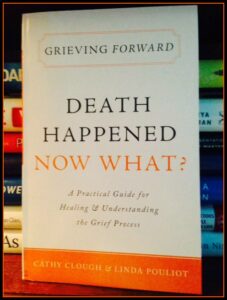The First Three Needs Of Every Griever

Guess what? You have needs! And since this is all about you healing—it’s important for you to know about these needs. Why? Because knowing about the first three needs of every griever makes it much easier to navigate the grieving process and the healing process. In fact, I believe that this information is foundational for healing.
The First Three Needs Identified
Grief expert Victoria Alexander identifies the first three needs of every griever in the introduction of her book, In The Wake of Suicide. They are: “finding the words of an unimaginable loss, speaking those words aloud, and knowing that they have been heard.” Let’s take a look.
Finding Your Words
Some people have all kinds of words spinning around in their mind after the death of a loved one and some people experience an empty head—with no words to be found. And it’s possible to experience everything in between. I personally experienced a loss of words when it came to what I was thinking and feeling. My mind felt blank.
What you need to know is that whatever you are experiencing—words or no words—is normal. What you also need to know is that as the death related shock and numbness wears off—faster for some of us than for others of us—access to words returns. The best way I can explain it is that it’s like a dimmer switch on a light in your brain that is almost on off. However, just before it gets to off it slowly reverses and begins turning the brightness of the light back up—and the words begin to flow once again.

Sometimes it’s helpful to look in books and online for words that ring true with what you are thinking and feeling, your experience, and to write these words down in a journal or keep an ongoing list that you can refer to when necessary. This is important to do because you also need to speak your words aloud.
Speak Your Words Aloud
Speak the words of your loss aloud over and over again. This is critical because your ears need to hear the words of your loss. In your own voice. Over and over again. For your mind and heart to believe it! What happened to your loved one—and what has happened to you is a lot for you to sort out and to process! So, tell your friends, your pet(s), the flowers in your garden, even your loved one who died… Tell them what you are thinking and how you are feeling. Share your story with anyone who will listen. This is an excellent time to join a good grief support group.
Healing Forward
At some point, and you will intuitively know when this is, it becomes necessary to redirect our words back to words of acceptance (we don’t have to like it, but we do have to accept it.), hope and courage. Even speaking aloud words related to new ideas for future plans and goals is helpful for healing. Because doing so redirects our thinking forward. And at the same time helps us to avoid getting stuck in a thinking, speaking and feelings loop of hopelessness and helplessness.
But Here’s The Catch
Sometimes redirecting our thoughts and words forward in a healing way happens automatically and sometimes it’s a choice—a choice that we may need to make over and over again.
Pay attention to the words that you are thinking and speaking—are your thoughts and words helping you to sort out what happened, how you feel, and to heal you forward? Or is your thinking and the words that you are speaking keeping you stuck in a pot hole of misery along the path of healing? Healing is a choice—even when we don’t feel like it.
You Need To Know That You Have Been Heard
In our book, Grieving Forward: Death Happened, Now What? I share the following:
“When we know our words have been heard, we feel validated, supported, and cared for. There is a level of peace that comes from knowing that the people we are sharing our grief story and feelings with “get it”. Once our words are heard regarding a particular or specific grief issue, we are free to move forward and tackle the next grief issue that we need to resolve.”
Sometimes family members and friends grow weary of listening to us. Aggravating as this is—it’s normal. And sometimes we have to listen to family members and friends because they need to share their feelings related to the loss—until they drive us nuts. Again, this is when joining a good grief support group is helpful.
There Is Science Behind Storytelling
Dr. Daniel Siegel, MD and Tina Payne Bryson, Ph.D. share the following in their book, The Whole-Brain Child 12 Revolutionary Strategies To Nurture Your Child’s Developing Mind:
“The right side of our brain processes our emotions and autobiographical memories, but our left side is what makes sense out of these feelings and recollections.1
They go on to share:
“This is what story telling does: it allows us to understand ourselves and our world by using both our left and right hemispheres together. To tell a story that makes sense, the left brain must put things in order, using words and logic. The right brain contributes the bodily sensations, raw emotions, and personal memories, so we can see the whole picture and communicate our experience. This is the scientific explanation behind why journaling and talking about a difficult event can be so powerful in helping us heal. In fact, research shows that merely assigning a name or label to what we feel literally calms down the activity of the emotional circuitry in the right hemisphere.”2
Now What?
Tell your story to anyone who will listen—including you! And if you have children consider purchasing the book, The Whole Brained Child by Dr. Daniel Seigel and Dr. Tina Payne Bryson because it is super helpful for parenting children. Keep in mind too that your children need to tell their death related story and to be heard.
End Note:
- Daniel J. Siegel, M.D., Tina Payne Bryson, Ph.D., The Whole-Brained Child 12 Revolutionary Strategies To Nurture Your Child’s Developing Mind (Bantam Books, New York, 2012): 28
- Daniel J. Siegel, M.D., Tina Payne Bryson, Ph.D., The Whole-Brained Child 12 Revolutionary Strategies To Nurture Your Child’s Developing Mind (Bantam Books, New York, 2012): 29

